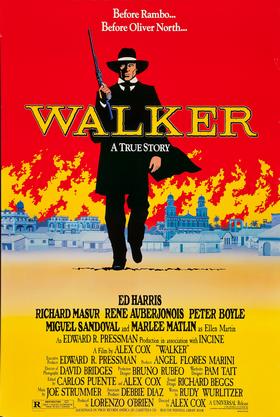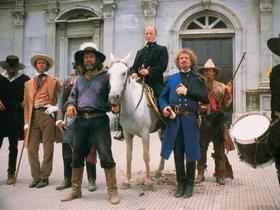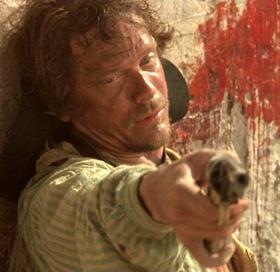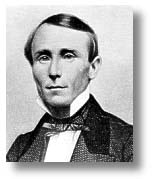Walker
 for unspecified reasons.
for unspecified reasons.
Reviewed by: Brett Willis
CONTRIBUTOR
| Moral Rating: | Very Offensive |
| Moviemaking Quality: |
|
| Primary Audience: | Adults |
| Genre: | Biography War Drama Satire |
| Length: | 1 hr. 34 min. |
| Year of Release: | 1987 |
| USA Release: |
December 4, 1987 (wide release) |





This satirical film set in the 1850s is intentionally full of postmodern anachronisms, such as: helicopters, Zippo lighters, automatic rifles, Diet Coke, magazines and cars.
For example, as Walker and his men exit the church, singing “Onward, Christian Soldiers”, a helicopter arrives filled with American troops clad in modern-day military gear.
As the movie progresses, the inaccuracies become more and more extreme, and it is obvious that the director is using the device to accentuate modern-day events (1980s US involvement in Nicaraguan Conta War) with the 1850s Walker era.

The real William Walker (1824-1860), born in Nashville, Tennessee
“Filibuster” / “freebooters” — someone who engages in an unauthorized military expedition into a foreign country or territory to foster or support a political revolution or secession
The English term “filibuster” derives from the Spanish filibustero, itself deriving originally from the Dutch vrijbuiter, “privateer, pirate, robber” (also the root of English “freebooter”). The Spanish form entered the English language in the 1850s, as applied to military adventurers from the United States then operating in Central America and the Spanish West Indies.
| Featuring |
|---|
|
Ed Harris Peter Boyle Xander Berkeley Marlee Matlin Rene Auberjoinis Richard Masur Keith Szarabajka, Sy Richardson, John Diehl, Miguel Sandoval |
| Director |
|
Alex Cox |
| Producer |
| Angel Flores Marini, Edward R. Pressman |
| Distributor |
This film is strangely uneven; it’s well-researched and starts out dealing seriously with an embarrassing but interesting segment of American history, then takes a nosedive which in my opinion defeats its social-consciousness purpose.
As the story opens in 1853, American adventurer William Walker (Ed Harris) and his mercenaries are driven out of N.W. Mexico (specifically Baja California and Sonora), which they had briefly ruled. [Historical note: Mexico considered the northern section of Walker’s former “kingdom” to be politically unstable, and sold it to the U.S. later that year in the Gadsden Purchase.] Once back in the U.S., Walker is tried for violating the Neutrality Act, but acquitted.
Soon he’s offered another soldier-of-fortune adventure, financed this time by millionaire Cornelius Vanderbilt (Peter Boyle). At first Walker refuses, but after the death of his girlfriend Ellen Martin (Marlee Matlin) there’s nothing to hold him back and he accepts the offer. Sailing with a band of mercenaries who will be known as “The Immortals,” he joins a revolutionary faction in Nicaragua and overthrows the existing government. He claims to be the Emperor of Nicaragua (ruling from 1856-57) and the “Grey-eyed Man of Destiny” found in Central American legend.
As portrayed in this film, Walker starts out as a man of principle but becomes power-mad and willing to discard any and all of his principles for convenience. he’s also shown as cold and heartless, and maybe a little touched in the head.
Content of concern
VIOLENCE: There are war scenes with a great deal of gore (the blood-splatter special effects are so overdone that they’re almost comical).
LANGUAGE: The language is strong (this includes English, Spanish, and Matlin’s use of sign language).
SEX/NUDITY: There are some nonsexual scenes of topless women bathing/washing clothes in a river, and an implied sex scene between Walker and an aristocratic Nicaraguan woman.
Historicity
The film gives a reasonably good but incomplete glimpse of the real William Walker. He was born in Tennessee in 1824, graduated from college at 14 and was a physician, surgeon and lawyer by 21. He also worked as a reporter before finding his “calling” as a “filibuster” (mercenary). He did dress in a long black coat and floppy hat, as shown. At only 5’2” and 120 pounds, he must have had a tremendous oratorical style to persuade men to follow him to near-certain death in the hope of fulfilling America’s “Manifest Destiny” to rule the entire Western Hemisphere (a commonly-held doctrine at that time).
The opening credits don’t say the usual “Based on a True Story,” but instead flatly declare “This Is a True Story.” That claim is NOT fulfilled. At first the film is fairly historically accurate although I was annoyed by the merging of separate events into one, by the use of repeating rifles rather than muzzle-loaders and by an 1855 reference to President Buchanan (who didn’t take office until 1857).
Later, it seems that budget considerations take over and we get cheap special effects like the nighttime burning of a town which is actually just the burning of some scaffolding erected in front of the buildings. In the final half-hour, all semblance of historicity is discarded, in an obvious effort to portray President Reagan’s support of Nicaraguan anti-Communists as a direct descendent of the shenanigans pulled by people like Vanderbilt. I won’t give away the silly plot devices used to make that connection; they must be seen to be believed (no, that isn’t a recommendation that anyone see the film).
If the bottom line had been that the U.S.’ constant interference in Latin American affairs during the 19th and early 20th Centuries created a resentment that the Communists could and did exploit, and that we’re now reaping what we sowed, I’d agree. But the film fails because it tries to say too much. Active opposition to atheistic communism (and to its stated aim of taking over the entire world) is not wrong. Such opposition is not a renewal of Manifest Destiny, but a matter of survival. When Communism wins, everyone loses; preaching the Gospel is made a criminal act, and all freedoms—even freedom of thought—are lost. I’ll always be thankful for a President who, whatever shortcomings he may have had, finally stood up to the Soviet Union and was instrumental in its dissolution. Today we need leaders who will likewise stand against other enemies.


PLEASE share your observations and insights to be posted here.

